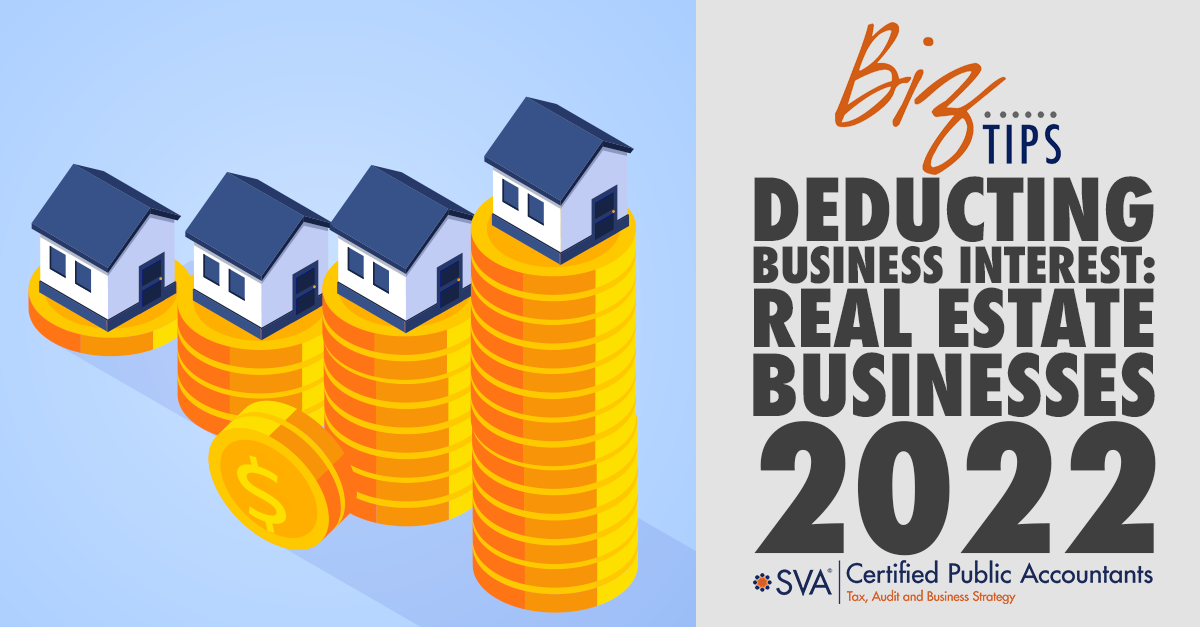Business owners can deduct certain types of interest from their taxable income. Interest expenses come from any type of business loan including mortgages and loans related to purchasing business property or obtaining operating capital.
However, this deduction has some limitations that every real estate business owner should know. The tax year 2022 also has a few changes to the general deduction rules that should be on any business owner’s radar.
Understanding the Business Interest Deduction
Business owners cannot automatically deduct every type of interest expense. However, the definition of loans that have deductible interest is pretty extensive—it also favors common real estate business expenses. Examples of interest expenses often include:
- Mortgages to buy property for real estate businesses
- Loans in the “normal course of business” (such as operating loans or annual input loans)
- Investment loans
- Lines of credit
- Interest expense on portfolio income
Businesses must meet certain qualifications to deduct the interest. In general, the following rules apply:
- The business must be liable for the debt (not individuals).
- There is some activity on the loan (i.e., making payments or taking money out on a line of credit).
- It must be a true “arms-length” transaction, which means there is a true debtor-creditor relationship.
The IRS is likely to review loans with family members or business partners much closer when it comes to deducting business interest from income.
Investment Interest Expenses
Money borrowed to purchase real property to hold for investment purposes is deductible. However, investment monies are not earned in the “ordinary course of business.” Instead, they produce dividends, interest, or royalties. That means that if the company purchases a real property to rent out, it is not considered an “investment.” Instead, it is a loan in the normal course of business.
This distinction is important because there are certain limitations to business interest deductions for investment property. Specifically, businesses are limited to deducting no more than their net investment income. If the company is losing money on the investment property, for example, that loss will not offset any further income at tax time. Companies can, however, often carry over excess interest expenses to a future year.
Non-Deductible Business Interest Expenses
Interest that must be capitalized (interest that is added to the loan's principal balance) cannot be deducted as business interest. Instead, it must be depreciated like other costs associated with acquiring the business asset.
Of course, loans incurred for personal reasons, even if the loan is in the name of the business, cannot be deducted from business income.
Current Limitations to the Business Interest Expenses
The Tax Cuts and Jobs Act of 2017 changed Section 163(j) of the Tax Code by limiting the business income expense for any tax year after 2017. At the time, that limitation applied to taxpayers who had gross receipts of $25 million or more. In 2022, that limitation has decreased slightly to apply to those who have gross receipts at or above $27 million (based on a three-year average).
In addition to this general limitation, the business interest expense is limited to the sum of three parts:
- Business interest income,
- 30% of Adjusted Taxable Income (ATI), and
- Floor plan financing interest.
Any interest expense that is not allowed because of these limitations can usually be carried over to the following year.
Tax Year 2022 Changes to the Business Interest Expense
The Coronavirus Aid, Relief, and Economic Security Act (CARES Act) was passed in 2020 in response to the COVID-19 pandemic and the economic effect it was having on businesses. As part of the CARES Act, taxpayers can use 50% of their ATI limitation for 2019 and 2020 (instead of the normal 30%). The result was that many businesses could deduct their business interest in full for those years.
In 2022, however, the business interest expense limitation is going back to its normal 30% of ATI. Because businesses might not have any carryover from prior years, this change might hit some businesses hard, especially those in the real estate industry.
Planning for 2022 Changes to the Business Income Expense
To avoid some of these issues, companies might want to look into qualifying as a “small business.” If qualified, the limitations of Section 163(j) will not apply. The type of business (i.e., partnership, individual, LLC, etc.) and the gross receipts of the company will dictate whether it will qualify as a “small business.”
Real estate businesses might also want to consider opting out of the 163(j) limitation. However, if they do that, keep in mind that it is an irrevocable, one-time election. If the company makes this election, they are required to depreciate their assets over a longer period based on the Alternative Depreciation System (ADS). This change applies to both current and future rental property.
Consider the cost-benefit of this election carefully before choosing to opt out of Section 163(j). Once opted out, it cannot be changed. Switching to the ADS means that the business cannot use bonus depreciation on improvements and both residential and non-residential properties have depreciable lives of a few years longer.

© 2022 CPA ContentPlus

